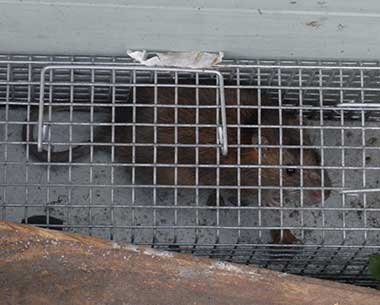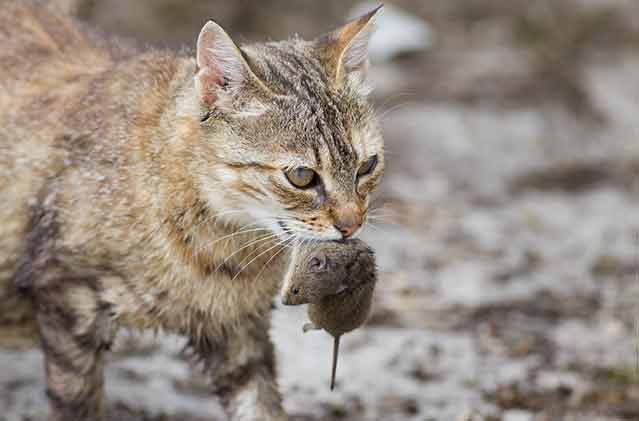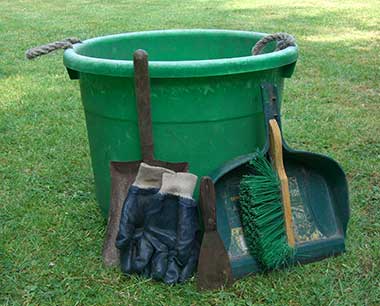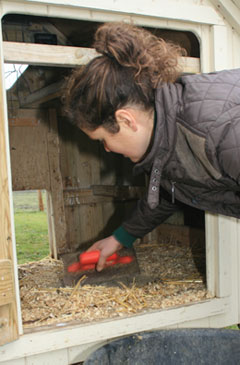My grandad once said to me “Where there’s chickens, there’s rats and mice” and how right he was. Over the years, I have had a number of occasions where I’ve had to fight a seemingly never-ending battle with them. There are a few things I have learnt along the way though and (touch wood) over the last few years, being more vigilant and removing food and water at night during the winter has really helped.
Rats
Rats are a serious pain in the bum and I am glad that I have only ever had one serious problem when I caught 10 of them in a week. They chew their way in and gnaw at chickens legs, steal eggs and spread disease.
They have to be near to water – so remove water at night if you get them to discourage them. They will move around so you might be fine in the summer to find them moving in during colder weather. I have found the spring traps to be of mixed success: you need to get them used to them and always wear gloves when setting them so they don’t smell you. Their favourite food seems to be cat food or tuna. Young rats are easier to catch but the older rats can be quite wise when it comes to traps. Place them in runs they are taking and provide cover over the top so they are out of sight and sheltered.
Poison is a very effective way of getting rid of them but do be careful using this, especially if there are cats that hunt rats and mice around the neighbourhood. Stuff bait packs into holes and cover with bricks or use a tubular box feeder with a clear tube so you can see the poison level left.

Rat in a humane trap. Dispatch is with an air rifle to the back of the head.
Personally, I prefer humane rat traps – they can be left set permanently near the chicken house. We dispatch the rat with an air rifle shooting through the back of the head. It’s an instant kill.
Always wear gloves when handling rats. They can carry serious diseases. Wear gloves when resetting the trap too since the smell from your hands would put off the next rat from going in there and usually where there’s one.. there’s several others.
Mice
Mice are the most common pest faced by the chicken keeper. They will spoil chicken food by urinating over it (whilst tucking in) and will urinate in water left out which is putting your birds at risk of catching disease.
Fortunately mice are easy to control with traps. I keep a couple of traps set near my feed in the shed where I will soon notice a problem during my daily feeding routine. Mice are usually a problem between October and April when food is scarce outdoors.

Good puss!
An enthusiastic cat is another good control method but remember to praise your cat when she brings a live mouse into the bedroom at 3am and meows at you…. Seriously! She is bringing you a gift and will be very pleased with herself, she cannot understand why you suddenly go mad and scald her!
Remember to remove all feed and water that Rats and Mice can get to at night






Hi, I’m completely new to chicken keeping – am picking up my rescue hens tomorrow! I’ve been reading about giving corn as a ‘scratch’ feed in the afternoons to my lovely ladies but is this likely to attract rats into the pen?
No, if you scatter a handful for each hen to find, they will eat all of it before bed and there won’t be any food left around for the rats.
My chickens free range in the garden. We have many birds of prey fly round here but there are plenty of places that the chicks can run and hide The cockerels and all the wild garden birds give the alarm. I also have a lovely cat Ellie who has been with the chickens since they hatched. She does not bother the chickens or the wild birds and they ignore her. She does however regularly patrol her territory and this does discourage rodents. They do not like the smell of cat. She catches mice and I always praise her. I don’t like it but they can be a pest. I have at times had to use rat poison. But it is a while now since I have seen any
My chickens eat the mice and rats. They are almost as good as a cat. My chickens are free range.
Dispatch the rat with an air rifle????? What? Killing a living thing for being a nuisance! Respect all life please
It is a requirement to notify the local authority about vermin on your property under the prevention of damage by pests act. If you don’t control pests yourself, they will do it and charge you for it using poison.
Personally I’d consider this method far kinder than using poison which is a slower death and can cause cats problems if they eat rats or mice.
Rats can also carry diseases, in fact a farmer I knew picked up a dead rat in his yard and put it in the bin. He contracted Weil’s disease fell sick and sadly is no longer with us… I was very shocked that it could kill like this.
So whilst I respect your view and do respect life, there are good reasons to control rats.
We had three large rats living under our chicken coop that routinely scuttled out during the day to grab feed. My partner put our chickens in the coop and then used an air rifle with scope from an upstairs window and dispatched all three one by one over the course of four hours. All head shots, all clean kills, no poison and all chickens and adjoining farm property safe due to angle of shot from above. This was the second time, he took two out from the same spot the year previous to this one. Rats carry weils disease and breed very fast. Poisoning is very cruel and risks the extended food chain but ignoring rats creates a massive problem given their breeding habits. You need a scope, a good air rifle and to have your sights set via a target. Going from above is the safest way to make sure pellets hit the ground. You also need to be 50 metres from the centre of any legal highway if you are going to be legal. We have feral farm cats in our area as well, but rats will always find their way under a chicken coop if bits of food are about, we now have a treadle feeder which we did not have at the time. Since the treadle feeder we have had no rats so perhaps start as you mean to go on rather than learning ‘post rat’ influx as we did.